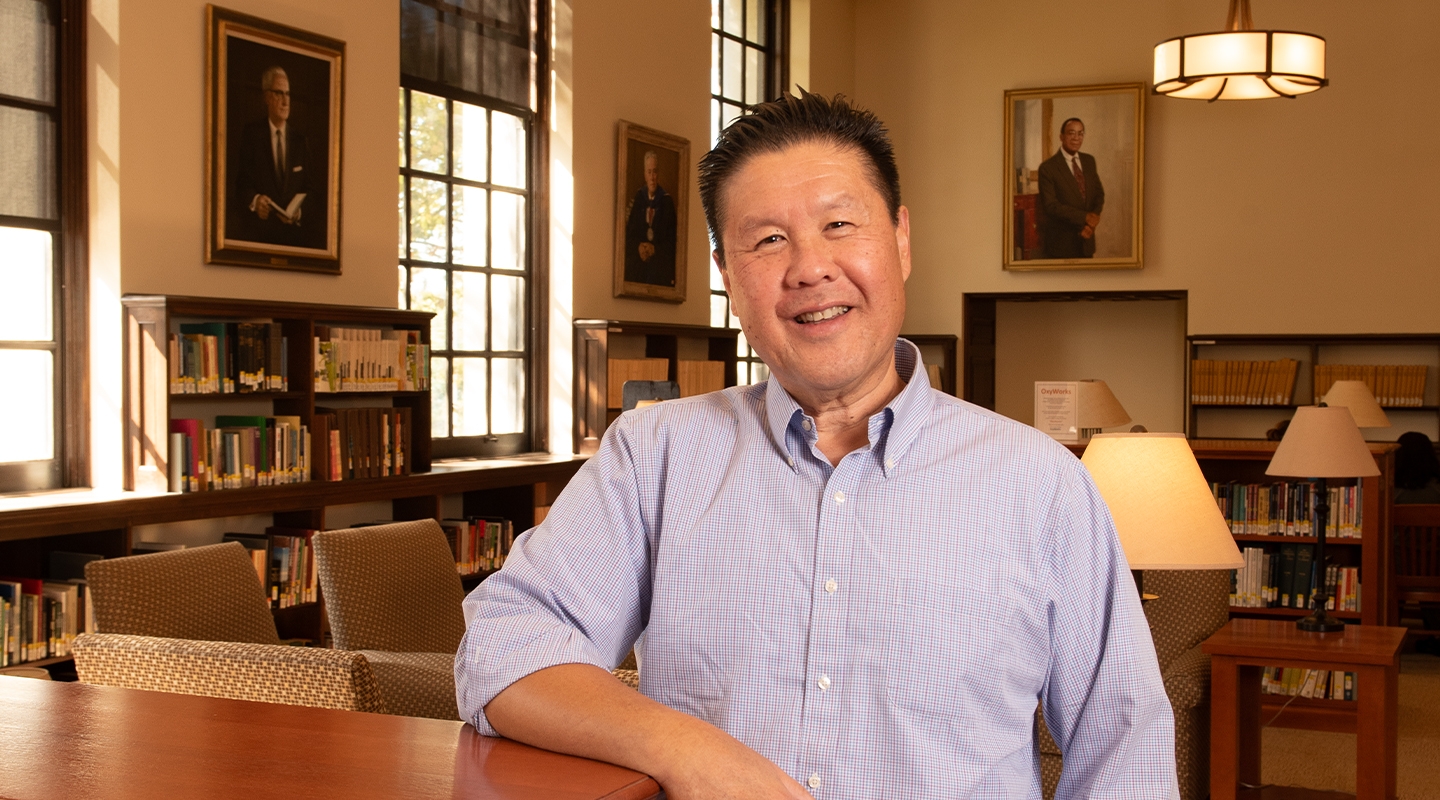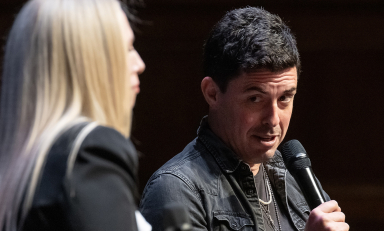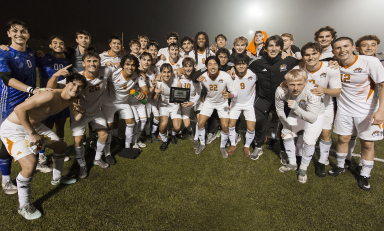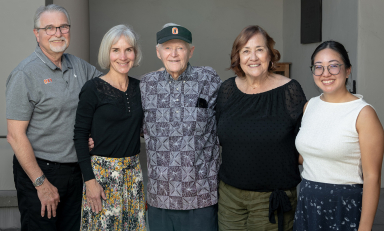Separated by 2,700 miles, National Labor Relations Board administrative law judges Brian Gee ’87 and Ira Sandron ’71 find common ground in Oxy
Whenever Administrative Law Judge Ira Sandron ’71 of Miami is in Los Angeles for a trial, he has lunch with his L.A.-based counterpart, Brian Gee ’87. “We enjoy reminiscing as well as discussing procedural issues,” says Sandron, who works out of the Washington, D.C., Branch of the Division of Judges within the National Labor Relations Board (NLRB).
“Ira and I have a lot in common, including our shared Oxy experience,” says Gee, who works out of the San Francisco Branch—just like Sandron did at the outset of his nearly 50-year career in government service.
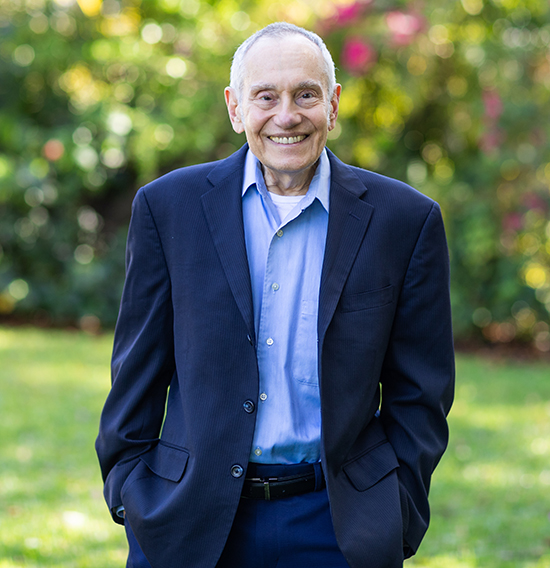
“The substantive knowledge and writing and analytical skills that I gained from my time at Occidental paved the way for me to become a government lawyer and administrative judge,” says Sandron, who majored in political science and was encouraged by his adviser, Professor Richard Reath, to be a congressional intern in summer 1970 and to go on to law school.
“I use my Oxy education every single day of my life,” says Gee, who majored in history and lives with his wife, Grace Choe ’88, in Los Angeles. “As a judge, I need to concisely explain nuanced concepts. Without the Oxy writing program, I wouldn’t be the clear writer I am today.”
What was the atmosphere at Oxy like during your respective eras?
Sandron: Reflecting the national debate over the Vietnam War, there was a large peace movement on campus that wanted the College to advocate against the war. Some professors and students disagreed with this, asserting that the College should refrain from taking any position. Importantly, Occidental fostered an atmosphere of tolerance and respect for other points of view, despite the heated emotions that the war engendered.
Gee: When I arrived in 1983, the vibe at Oxy was still laid-back and liberal artsy. The emphasis was on personal growth, not necessarily about finding the right career. Over the years, the Reagan era started to seep in, and by the time I graduated, people had started thinking more about careers and professional grad schools—nothing wrong with that, it was just a change.
Did any particular professors of classes at Oxy have a lasting impact on you?
Sandron: In addition to Dr. Reath, I had a special relationship with political science professors James Lare, Raymond McKelvey, and Jane Jaquette. They all contributed to my knowledge of politics, our constitutional system, and the interface of law and society.
Gee: As a senior, I had an independent study project on Asian American literature with David Axeen. I chose the books and got together with Professor Axeen to discuss them. Our conversations were always interesting and enriching. I was also influenced by Eric Newhall ’67, my professor for American literature, and his humble, self-effacing way of speaking. To this day, I follow his example and phrase my positions with, “I think….”
Why did you pursue a career in law?
Gee: During my junior year, I had an internship at an L.A. city councilman’s district office. One day, a homeless man came into the office and asked for help. I made some calls and was able to get him immediate assistance. After that experience, I knew I wanted to use law to pursue community service. It wasn’t so much law but rather what I could achieve through law that motivated me. It still does.
Sandron: I always enjoyed writing and following politics, and from my poli sci classes, particularly constitutional law, I decided early on that I wished to pursue a legal career.
How did your law school experience influence your trajectory?
Sandron: Duke Law School actively recruited seniors, and Dr. Reath had received very positive feedback from alumni who had gone there. Charles H. Livengood Jr., former chair of the American Bar Association’s Labor and Employment Law section, taught most of the labor law courses at Duke. I was his research assistant during my third year. Prior to graduation, I accepted a job offer with Region 31 of the NLRB in Los Angeles.
Gee: Because I wanted to focus on employment and labor law, I asked Vanderbilt Law Professor Robert Belton, an accomplished employment and civil rights lawyer, to be my adviser. He emphasized to students the importance and dignity of work, and encouraged me to pursue a career with the NLRB.
How did your work as federal trial attorneys prepare you to serve as judges?
Sandron: I was a trial attorney for the NLRB, the Federal Labor Relations Authority, and the Immigration and Naturalization Service before becoming an immigration judge in 1991. I learned the importance of being prepared, of treating everyone with respect, and of realizing that trial strategies are not locked in concrete but often need to be adjusted depending on the course of a hearing.
Gee: Trial work, at its core, is simply presenting a compelling narrative through witnesses and documentary evidence. If you tell a story that is believable and compelling, then the legal analysis part naturally flows your way. As a history major, I always enjoyed explaining how something came to be. It was by litigating a lot of cases as a younger attorney that I developed the background to become an administrative law judge.
How would you describe the role of administrative law judge?
Sandron: My primary responsibility is to apply the law even-handedly and to serve the public interest in the best way that I can. The challenge can be in balancing the need to conduct a trial efficiently so as to minimize the burden in time and expense for the government and all other participants, while at the same time affording the parties the opportunity to present relevant evidence for a full record. At times, I serve a quasi-mediator role before the hearing opens. Engaging in dispute resolution that ends with a settlement acceptable to all parties is quite satisfying.
Gee: In most trials, you have two opposing parties who present differing versions of events. Did this happen or did that happen? Our first job as judges is to oversee the hearing to make sure that all parties get the chance to present their version of the case fairly and fully. That’s crucial because the trial record is all that appellate bodies see. Once we have an evidentiary record, I decide which facts are most credible and then simply apply fact to law. We judges don’t have authority to make law—we just apply the credible facts to existing case law and then draw a conclusion.
What do you find most rewarding about your work?
Sandron: No two cases are identical. I go to different cities to hear cases involving a wide range of respondents—usually employers but sometimes unions. During the course of the trials, I learn about different industries, including how technological developments impact on how they operate. Some respondents are mom-and-pop businesses, while others are billion-dollar corporations.
Attorneys differ widely in temperament and/or competence, and witnesses’ credibility has to be determined based on their demeanor, the content of their testimony, and credited evidence in the record. I enjoy the challenge of analyzing witness testimony and documents and writing a decision that is persuasive and hopefully will be upheld on appeal by the agency and the federal courts.
Gee: I went into public service just to make sure regular people get treated fairly. In a workplace, there is a hierarchy. But in a courtroom, everyone is equal. I find it rewarding that the employee witnesses in my courtroom have the opportunity to come and tell their story.
What advice would you give to current Oxy students who are considering a career in law or public service?
Gee: While I was pretty sure about my career path after graduation, I took my time to make sure. I worked for five years between Oxy and law school, and really benefited from that time to grow as a person. By the time I entered law school, I knew 100 percent that was what I wanted to do.
Sandron: If you are interested in law or public service, take as many classes in those subjects as you can. In today’s world, there are attorneys who have specialized expertise, so consider having a second major and eventually getting a joint degree. Knowledge and understanding of artificial intelligence is increasingly necessary in the legal profession. The most important consideration is that you have a genuine interest in what you pursue.
Top photo: Growing up in Highland Park, Gee would study in the Occidental library while in high school.

